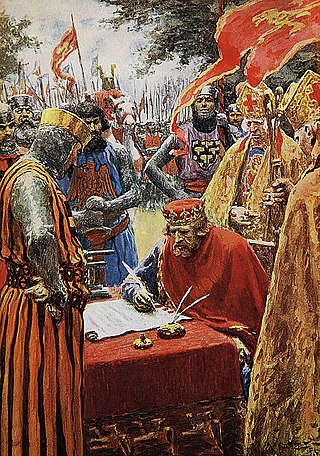Related Research Articles

Jersey, also known as the Bailiwick of Jersey, is an island country and self-governing British Crown Dependency near the coast of north-west France. It is the largest of the Channel Islands and is 14 miles (23 km) from the Cotentin Peninsula in Normandy. The Bailiwick consists of the main island of Jersey and some surrounding uninhabited islands and rocks including Les Dirouilles, Les Écréhous, Les Minquiers, and Les Pierres de Lecq.

A courthouse or court house is a structure which houses judicial functions for a governmental entity such as a state, region, province, county, prefecture, regency, or similar governmental unit. A courthouse is home to one or more courtrooms, the enclosed space in which a judge presides over a court, and one or more chambers, the private offices of judges. Larger courthouses often also have space for offices of judicial support staff such as court clerks and deputy clerks.
The Bailiff is the chief justice in each of the Channel Island bailiwicks of Guernsey and Jersey, also serving as president of the legislature and having ceremonial and executive functions. Each bailiwick has possessed its own bailiff since the islands were divided into two jurisdictions in the 13th century. The bailiffs and deputy bailiffs are appointed by the Crown on the advice of the Secretary of State for Justice and may hold office until retirement age.
The jurats are lay people in Guernsey and Jersey who act as judges of fact rather than law, though they preside over land conveyances and liquor licensing. In Alderney, however, the jurats are judges of both fact and law in both civil and criminal matters.

A law clerk, judicial clerk, or judicial assistant is a person, often a lawyer, that provides direct counsel and assistance to a lawyer or judge by researching issues and drafting legal opinions for cases before the court. Judicial clerks often play significant roles in the formation of case law through their influence upon judges' decisions. Judicial clerks should not be confused with legal clerks, court clerks, or courtroom deputies who only provide secretarial and administrative support to attorneys and/or judges.
A court clerk is an officer of the court whose responsibilities include maintaining records of a court and administering oaths to witnesses, jurors, and grand jurors as well as performing some quasi-secretarial duties. The records management duties of a court clerk including the acceptance of documents for filing with the court to become part of the court's official records, and maintaining the docket, register of actions, and/or minutes of the court which list all filings and events in each case. These duties are important because the availability of legal relief often depends upon the timely filing of documents before applicable deadlines.

The States Assembly is the parliament of Jersey, formed of the island's 37 deputies and the Connétable of each of the twelve parishes.

Jersey Legal French, also known as Jersey French, was the official dialect of French used administratively in Jersey. Since the anglicisation of the island, it survives as a written language for some laws, contracts, and other documents. Jersey's parliament, the States of Jersey, is part of the Assemblée parlementaire de la Francophonie. The use of the English language has been allowed in legislative debates since 2 February 1900; the current use of French in the States of Jersey is generally restricted to certain limited official state functions and formalities.
Channel Island English refers to Alderney English, Guernsey English and Jersey English and similar dialects of English found in the other Channel Islands.

The Viscount of Jersey has, since the 14th century, been the chief executive officer of the Royal Court of Jersey. Since 1930, court services have been provided by the Viscount's Department in conjunction with the Judicial Greffe. Until 1973 the Viscount was appointed by the Crown; since 1973 Viscounts have been appointed by the Bailiff of Jersey.
The government of Virginia combines the executive, legislative and judicial branches of authority in the Commonwealth of Virginia. The current governor of Virginia is Glenn Youngkin. The State Capitol building in Richmond was designed by Thomas Jefferson, and the cornerstone was laid by Governor Patrick Henry in 1785. Virginia currently functions under the 1971 Constitution of Virginia. It is Virginia's seventh constitution. Under the Constitution, the government is composed of three branches: the legislative, the executive and the judicial.
In the United States, state governments are institutional units exercising functions of government at a level below that of the federal government. Each U.S. state's government holds legislative, executive, and judicial authority over a defined geographic territory. The United States comprises 50 states: 9 of the Thirteen Colonies that were already part of the United States at the time the Constitution took effect in 1789, 4 that ratified the Constitution after its commencement, plus 37 that have been admitted since by Congress as authorized under Article IV, Section 3 of the Constitution.

The law of Jersey has been influenced by several different legal traditions, in particular Norman customary law, English common law and modern French civil law. The Bailiwick of Jersey is a separate jurisdiction from that of the United Kingdom, and is also distinct from that of the other Channel Islands such as Guernsey, although they do share some historical developments. Jersey's legal system is 'mixed' or 'pluralistic', and sources of law are in French and English languages, although since the 1950s the main working language of the legal system is English.

The Courts of Jersey are responsible for the administration of justice in the Bailiwick of Jersey, one of the Channel Islands. They apply the law of the Island, which is a mixture of customary law and legislation passed by the legislature, the States Assembly.
A clerk is a senior official of many municipal governments in the English-speaking world. In some communities, including most in the United States, the position is elected, but in many others, the clerk is appointed to their post. In the UK, a town or parish clerk is appointed by the town or parish council members. In almost all cases, the actual title of the clerk reflects the type of municipality they work for; thus, instead of simply being known as the clerk, the position is generally referred to as the town clerk, township clerk, city clerk, village clerk, borough clerk, board secretary, or county clerk. Other titles also exist, such as recorder and corporate officer. The office has existed for centuries, though in some places it is now being merged with other positions.

The Courts of Guernsey are responsible for the administration of justice in the Bailiwick of Guernsey, one of the Channel Islands. They apply the law of the Island, which is a mixture of customary law dating back as far as the 10th century and legislation passed by the legislature, the States of Deliberation.

Healthcare in Jersey is provided by a range of publicly and privately owned providers. Health matters are overseen by the Department of Health and Community Services in the Government of Jersey. The current Health Minister is Deputy Richard Renouf.

The Bailiwick of Jersey has an unwritten constitution arising from the Treaty of Paris (1259). When Henry III and the King of France came to terms over the Duchy of Normandy, the Norman mainland the suzerainty of the King of France. The Channel Islands however remained loyal to the British crown due to the loyalties of its Seigneurs. But they were never absorbed into the Kingdom of England by any Act of Union and exist as "peculiars of the Crown".

The Royal Court is the principal and oldest court in Jersey, and exercises both criminal and civil jurisdiction. It can sit in a number of configurations, depending on the type of case and the powers to be exercised.
References
- ↑ Greffier at Wiktionary
- ↑ Greffe at Wiktionary
- 1 2 "About the States Greffe". States of Jersey. Retrieved 5 February 2020.
- ↑ "Non executive and legal departments: Judicial Greffe". States of Jersey. Retrieved 2 March 2011.
- ↑ "Royal Court". Jersey Courts. Archived from the original on 4 August 2012. Retrieved 2 March 2011.
- ↑ "Non executive and legal departments: States Greffe". States of Jersey. Retrieved 5 February 2020.
- ↑ See any of the Propositions on the States website.
- ↑ "Greffier: Les fonctions". Ministère de la Justice (in French). Retrieved 9 January 2015.